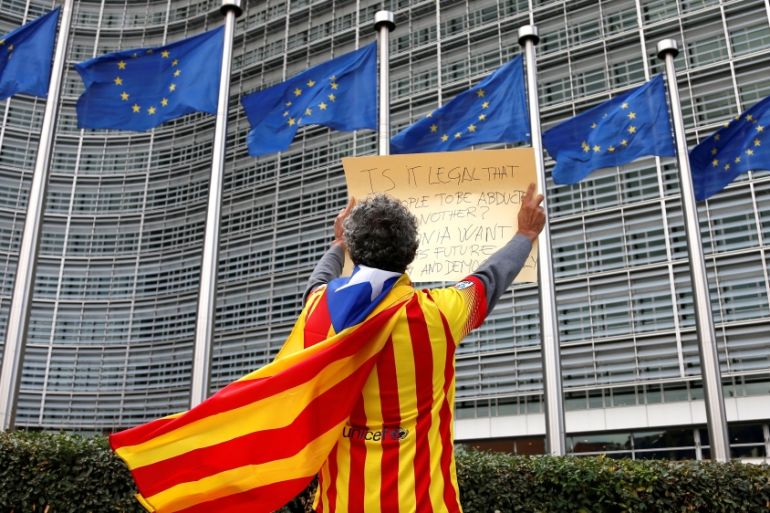Catalonia set to vote with separatists in jail, exile
Catalonia will vote in snap elections on Thursday in a bid to end its separatist crisis. Where does the region stand?

Catalonia, the breakaway region with its own culture and language in northeastern Spain, is set to hold snap elections on Thursday that are widely seen as another referendum on independence.
The Catalan parliament declared independence from Spain on October 27 after an October 1 independence referendum that saw 90 percent vote to separate, although turnout was less than 50 percent and marred by violent repression from Spanish police.
Keep reading
list of 4 itemsDivisive Catalan amnesty bill clears parliamentary hurdle in Spain
Large protests against Catalan amnesty deal in Madrid after PM sworn in
Thousands protest against Catalan amnesty in Spain
The Catalan regional government was quickly dismissed after Article 155 of the Spanish constitution, a previously-unused measure that allows the national government to assume the role of regional government, was enacted.
Spanish Prime Minister Mariano Rajoy said at the time that Article 155 and new elections would reestablish “normalcy”.
While Rajoy would like to see a Catalan government in favour of remaining a part of Spain, this isn’t guaranteed. Unionist parties have gained support in the polls, but they don’t have a clear victory ahead.
The Catalan political arena is once again divided between unionism and separatism, as it was in the 2015 election that put the separatist government in power.
The vote
There are 135 seats in the Catalan parliament. A party or coalition must win 68 seats for an absolute majority.
According to most polls, the centre-left Catalan Republican Left (ERC), headed by imprisoned former Catalan Vice President Oriol Junqueras, looks to pull ahead of the centre-right Together for Catalonia (JxCat) coalition, headed by former Catalan President Carles Puigdemont, who is in self-imposed exile in Brussels, by a slight margin.
ERC is projected to win between 30 and 32 seats, while is expected to win around 29. Then, the anti-capitalist left-wing Popular Unity Candidacy (CUP) is expected to win between seven and ten seats.
On the unionist side, the politically undesignated but generally right-wing Citizens (C’s) party leads the pack with an expected 31 to 35 seats. The Socialist Party of Catalonia, the regional branch of the centre-left national Spanish Socialist Party, is projected to win between 18 and 22 seats.
The People’s Party of Catalonia, the regional representative of the right-wing People’s Party, should garner between five and seven seats.
The remaining eight or nine seats will be allocated to the In Common We Can coalition, a joining of left-wing groups that are not explicitly unionist but do not support separatism, either.
It’s a toss-up, according to Ruben Martinez, an organiser with a Barcelona-wide pro-independence network called the Committees to Defend the Republic (CDR). “It will come down to a few seats in small provinces,” Martinez told Al Jazeera. “They could go to CUP or In Common We Can.”
Catalonia’s political future
If pro-independence parties win a majority, they will likely press forward with a separatist agenda. While independence is the driving force for JxCat and ERC, there has been a rupture between the separatist parties.
PDeCat and ERC formed the Together for Yes pro-independence coalition in the 2015 elections, which won a plurality of votes. However, they were unable to put together a joint list for Thursday’s elections.
Puigdemont still views himself as the rightful Catalan president, telling reporters in Brussels that he hasn’t been “dismissed by those who can do it, which is the Catalan parliament, I act as the president here, too.”
But Puigdemont may have competition from his former vice president, Junqueras.
Junqueras has been imprisoned since November 2, when eight ministers were jailed for their pro-independence actions. He is the only member of the former Catalan government that remains in prison, though two pro-independence civil society organisers, Jordi Cuixart and Jordi Sanchez – who is running on the JxCat ticket – are still behind bars.
The dismissed vice president told Catalan radio in a short phone interview from prison that he remains behind bars is because ERC has been forthright in their support of independence, in what some saw as a call-out for Puigdemont, who fled Catalonia after declaring independence.
If the unionist parties were to garner a majority, the clear leader would be Ines Arrimadas, the head of the C’s. Arrimadas is staunchly pro-Spain.
Arrimadas sits at the top of the list for the most popular unionist party in Catalonia, but she drew criticism after comparing Puigdemont and Junqueras with the armed Basque separatist group Euskadi Ta Askatasuna, which waged a rebellion against the Spanish state that killed hundreds of civilians.
The C’s often present themselves as working-class Catalan unionist party, although many Catalans feel Arrimadas and the rest of the party are aligned with the right.
Prohibited colours, alleged threats
For many Catalans, the right is increasingly seen as a threat. Martinez, the organiser with the CDR, said that “impunity is increasing” for far-right attacks, as well as repression from the right-wing national government.
Martinez pointed to the prohibition of displays of yellow, one of the colours of the Catalan flag which is closely related to the independence movement, on public buildings.
On December 17, eight Catalan teachers from La Seu d’Urgell, a town near the French border, were charged with inciting hate for hosting a debate on the independence process in their primary school.
Marta Rovira, the secretary-general of ERC who leads the party while Junqueras remains in prison, said on December 15 that Spanish authorities told separatist Catalan politicians that if they win the election and continue with the independence push, there “will be blood … there will be scenarios of extreme violence.”
Martinez hopes for the best and plans to continue organising in defence of the “Catalan Republic,” but the “moment [in Catalonia] is maddening.”
|
|